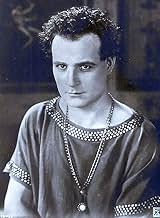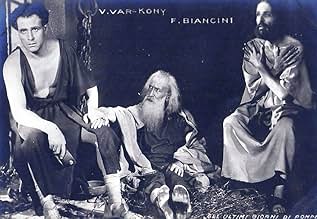IMDb RATING
6.3/10
48
YOUR RATING
Epic, melodramatic and rather risque adaptation of the British novel about ancient Roman decadence, culminates in the eruption of a nearby volcano.Epic, melodramatic and rather risque adaptation of the British novel about ancient Roman decadence, culminates in the eruption of a nearby volcano.Epic, melodramatic and rather risque adaptation of the British novel about ancient Roman decadence, culminates in the eruption of a nearby volcano.
- Directors
- Writers
- All cast & crew
- Production, box office & more at IMDbPro
Storyline
Did you know
- TriviaAccording to the December 1, 1926 issue of Cinéa-Ciné pour tous, that film grossed more money in a week (from November 12 to 18) than any other at the Aubert Palace of Paris ever since the creation of the theater.
- Alternate versionsThere's a 1996 video version in Spain, cut to 56 minutes. It was an American version with a voice over narration and no intertitles. In the main title, the movie was presented as the 1913 version, including a credit of Mario Caserini as the producer.
- ConnectionsFeatured in Cinema Europe: The Other Hollywood (1995)
Featured review
To begin with, my acquisition and current viewing of this one came purely by accident: the film was paired with the later 1959 version on a budget DVD (though actually advertised as being the even earlier rendition from 1913!); as for my watching it, I didn't consciously include the film at this juncture in my Epics challenge because of the similar WAR GODS OF BABYLON (1962) from the previous day but, simply, because I was pressed for time (more on this later). To get back to the confusion over which 'primitive' version was included on the DVD, in all fairness, one would be excused in thinking this emanated from the 1910s rather than the last days of the Silent era {sic}, considering the exaggerated acting style which had been all but surpassed by this time on display. This, however, is just as easily negated by the brief and pointless instances of nudity in the film not to mention the presence of German actor Bernhard Goetzke, best-known for playing Death in Fritz Lang's DESTINY (1921). In hindsight, I must admit that my exposure to early Italian cinema has been too scarce to pass objective judgment upon it!
Even so, my low rating of the film has more to do with the fact that it's a heavily-condensed version (lasting a measly 57 minutes) of the original, listed on the IMDb as having a hefty 147-minute running-time (presumably, at Silent-film speed)!; besides, the intertitles have been eliminated in favor of a droning narration in English (the epic film, then, seems to have made the U.S. rounds in this ungainly form). For this reason, it races through an elaborate plot featuring innumerable characters; what remains leans, predictably, towards melodrama: Boy loves Girl, Girl is under the spell of Magician, Boy also loved by Blind Waif and another woman (whose rejection leads her to consort with Magician in order to mix a love potion), a pagan Temple-boy sees the error of his ways and converts to Christianity, Magician kills the latter and is blackmailed by a greedy but unwise eye-witness, Boy (mystified by the drug) finds himself accused of the young priest's murder and is sentenced to fight for his life in the arena, Blind Waif (who's prone to atrocious singing and harp-playing!) finally sacrifices herself so as not to stand in the path of True Love, etc.
All of which, of course, leads to the volcanic eruption that's the true raison d'etre of the popular tale a spectacle which redeems this version to some extent. By the way, Victor Varconi who plays the part of the hero subsequently had a long career in Hollywood as a character actor; as for director Gallone, he too kept on working steadily for many years afterwards (I have his CARMEN DI TRASTEVERE [1962] in my "To Watch" list recorded off late-night Italian TV, a modernization of another much-filmed source Prosper Merimee''s "Carmen", which also inspired the famous Georges Bizet opera).
Even so, my low rating of the film has more to do with the fact that it's a heavily-condensed version (lasting a measly 57 minutes) of the original, listed on the IMDb as having a hefty 147-minute running-time (presumably, at Silent-film speed)!; besides, the intertitles have been eliminated in favor of a droning narration in English (the epic film, then, seems to have made the U.S. rounds in this ungainly form). For this reason, it races through an elaborate plot featuring innumerable characters; what remains leans, predictably, towards melodrama: Boy loves Girl, Girl is under the spell of Magician, Boy also loved by Blind Waif and another woman (whose rejection leads her to consort with Magician in order to mix a love potion), a pagan Temple-boy sees the error of his ways and converts to Christianity, Magician kills the latter and is blackmailed by a greedy but unwise eye-witness, Boy (mystified by the drug) finds himself accused of the young priest's murder and is sentenced to fight for his life in the arena, Blind Waif (who's prone to atrocious singing and harp-playing!) finally sacrifices herself so as not to stand in the path of True Love, etc.
All of which, of course, leads to the volcanic eruption that's the true raison d'etre of the popular tale a spectacle which redeems this version to some extent. By the way, Victor Varconi who plays the part of the hero subsequently had a long career in Hollywood as a character actor; as for director Gallone, he too kept on working steadily for many years afterwards (I have his CARMEN DI TRASTEVERE [1962] in my "To Watch" list recorded off late-night Italian TV, a modernization of another much-filmed source Prosper Merimee''s "Carmen", which also inspired the famous Georges Bizet opera).
- Bunuel1976
- Mar 6, 2008
- Permalink
Details
- Release date
- Country of origin
- Language
- Also known as
- Poslednji dani Pompeje
- Production company
- See more company credits at IMDbPro
- Runtime3 hours 1 minute
- Color
- Sound mix
- Aspect ratio
- 1.33 : 1
Contribute to this page
Suggest an edit or add missing content

Top Gap
By what name was The Last Days of Pompeii (1926) officially released in Canada in English?
Answer

















